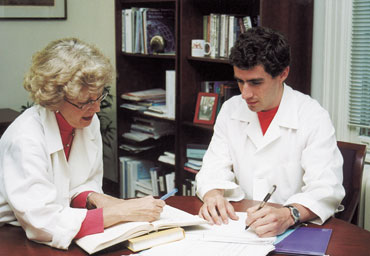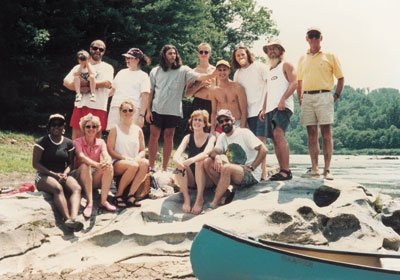

A publication of The Graduate School, University of North Carolina at Chapel Hill
Archives Fall 2001
Home | Back issues | About us | Email your feedback | The Graduate School | UNC-Chapel Hill | Make a gift
S h o p T a l k
Linda Dykstra on the art of collaboration
Have you ever traveled to a foreign land where you didn’t speak the language? Remember how difficult it was to order a meal or ask for simple directions?
 |
| Photo by Rich Fowler |
Anyone who’s been involved with advanced graduate study understands it can be just as difficult to communicate with people studying other disciplines. That’s why Linda Dykstra, dean of the Graduate School, works hard to expose graduate students at Carolina to other students across campus.
“We want to promote an environment at Carolina that allows students to move easily between disciplines and encourages a team oriented approach to solving problems,” Dykstra said.
Dykstra said her own academic endeavors have shown her the value of interdisciplinary approaches to research.
With advanced degrees in four different fields, she draws on the knowledge base from each to find answers to complex research questions. Dykstra has traversed a sinuous academic path and at every turn has met incredible success.
Her journey after high school began at Hope College, a small, liberal arts college in Michigan with a strong reputation for providing research opportunities for its students. Hope awarded Dykstra its prestigious Distinguished Alumni award this year.
“It was a given in my family if you wanted to go to college, you were going to Hope,” Dykstra said. “It didn’t occur to me to apply anywhere else.”
With undergraduate degrees in math and psychology from Hope under her belt, Dykstra went on to the University of Chicago as a Ford Foundation Fellow in English literature.
Dykstra departed from her literary interests to follow the advice of her psychology professor: to use her mathematical background to look more closely at behavior. “I took a course in behavioral analysis and found I could use my mathematical skills to understand the way in which drugs affect decision-making,” Dykstra said. Dykstra eventually received a Ph.D. in psychopharmacology, which she currently teaches at Carolina.
Dykstra has continued her research at Carolina for the past 29 years as a professor in the psychology and pharmacology departments, but that’s just one part of her very full life. She’s also been married for all those years to William Hylander, a biological anthropologist and current director of the primate center at Duke University. Linda and her husband have two children, Grayson and Rebecca. Grayson is currently a student at Elon University in North Carolina, and Rebecca is at Princeton University.
 |
| Photo courtesy of Linda Dykstra |
| Dykstra with students and colleagues on the North Fork of the New River in Southwest Virginia in 1995. All of the students shown here now hold research or faculty positions; four are faculty at North Carolina institutions. |
Add to Dykstra’s demanding schedule that she provides expertise, guidance and support for graduate students and post-doctoral fellows studying psychopharmacology in her lab. Dykstra said she tries very hard to offer support to her students in many ways. For instance, she and her students, along with family and friends, often plan outdoor trips and lab exchanges with other scientists.
“These activities outside the laboratory allow us to interact in a personal, less formal way,” Dykstra said. “This kind of interaction provides the foundation for successful working relationships. And these relationships, in turn, foster productive collaborations.”
Dykstra said building strong working relationships and keeping the interests of other disciplines in mind are two ways to be successful in graduate school.
As friend and mentor, Dykstra has set a strong example for her students. And her field of research is interdisciplinary in nature — it combines the fields of psychology and pharmacology.
In 1997, Dykstra and her mentor from the University of Chicago co-authored one of the first textbooks on psychopharmacology, which provides both a biochemical and a behavioral perspective on drug action. And her research prowess has brought literally millions of dollars to the University from outside funding sources, including grants from several research institutes of the National Institutes of Health, as well as from a number of corporate sponsors.
By studying the behavioral effects of drugs, she has contributed to the discovery of morphine-like pain relievers less likely to be abused or to produce severe toxicity. She has also helped develop safer drugs to treat heroin abuse, and she has investigated the relationships among morphine use, immune function and the spread of AIDS.
Dykstra also uses her research experience to train future researchers by serving as the director of a training grant from NIH. The program provides interdisciplinary graduate training in areas related to drug and alcohol abuse, while it prepares pre-doctoral students for careers either in basic or clinically related research. “Our training grants support students in a range of disciplines, including psychology, pharmacology, cell biology, neurobiology and pharmacy,” Dykstra says.
Dykstra has worked to encourage interdisciplinary studies by helping to create several graduate fellowship programs. By bringing together graduate students from various disciplines across campus, the Royster Society of Fellows, the Weiss Urban Livability Fellowship Program and the Latané Family Fellowship in Human Sciences each provide students an enriching interdisciplinary experience.
Dykstra is also excited about the Graduate School’s newest interdisciplinary program, Scholars for Tomorrow. This year, nine students from different disciplines will examine several aspects of computational sciences. Another eight students will investigate issues related to aesthetics in society.
The Scholars program supplements what graduate students already earn as teaching or research assistants. Dykstra said she hopes this kind of “top-up” award helps Carolina attract the country’s brightest students and provide them with a unique interdisciplinary experience.
Dykstra’s goal is to create 100 fellowships over the next several years in a way that makes Carolina unique. “The most creative solutions to research questions require that we approach them from a range of perspectives,” Dykstra said. “My goal is to give our students as many interdisciplinary opportunities as possible.”
-Tania E. Zeigler
© 2002, The Graduate School, The University of
North Carolina at Chapel Hill
All text and images are property of The Graduate School
at the University of North Carolina-Chapel Hill. Contact Sandra Hoeflich
at shoeflic@email.unc.edu
to request permission for reproduction.
Contact Alexandra Obregon at aobregon@email.unc.edu if you have technical problems with this Web site.